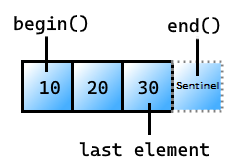ref_view class (C++ Standard Library)
A view that references the elements that belong to another range.
Syntax
template<std::ranges::range R>
requires std::is_object_v<R>
class ref_view : public ranges::view_interface<ref_view<R>>;
Template parameters
R
The range to reference.
Members
| Member functions | Description |
|---|---|
| ConstructorsC++20 | Construct a ref_view. |
baseC++20 |
Get a reference to the underlying range. |
beginC++20 |
Get an iterator to the first element. |
dataC++20 |
Get a pointer to the first element in the referenced range. |
emptyC++20 |
Test whether this ref_view is empty. |
endC++20 |
Get the sentinel at the end of this ref_view. |
sizeC++20 |
Get the number of elements. The underlying range must satisfy sized_range. |
Inherited from view_interface |
Description |
backC++20 |
Get the last element. |
frontC++20 |
Get the first element. |
operator[]C++20 |
Get the element at the specified position. |
operator boolC++20 |
Test whether this ref_view isn't empty. |
View characteristics
For a description of the following entries, see View class characteristics
| Characteristic | Description |
|---|---|
| Range adaptor | views::all or views::common |
| Underlying range | Must satisfy input_range |
| Element type | Same as the underlying range |
| View iterator category | Same as the underlying range |
| Sized | Only if the underlying range satisfies sized_range |
Is const-iterable |
Yes |
| Common range | Only if the underlying range satisfies common_range |
| Borrowed range | Yes |
Requirements
Header: <ranges> (since C++20)
Namespace: std::ranges
Compiler Option: /std:c++20 or later is required.
Constructors
Construct an instance of a ref_view
// construct a ref_view from a range
template<different-from<ref_view> R>
constexpr ref_view(R&& rg);
Parameters
rg
The range to reference.
For information about the template parameter type, see Template parameters.
Return value
A ref_view instance.
Remarks
The best way to create a ref_view is by using the views::all range adaptor. Range adaptors are the intended way to create view classes. The view types are exposed in case you want to create your own custom view type.
A ref_view is useful for converting a container to a view. For example, you can use ref_view to convert a vector to a view, which makes it inexpensive to pass the elements of the vector around.
Example: ref_view
// requires /std:c++20 or later
#include <ranges>
#include <iostream>
#include <vector>
int main()
{
std::vector<int> v = {1,2,3};
auto refView = std::views::all(v);
std::cout << &refView[1] << " : " << &v[1]; // outputs two identical memory addresses, e.g. 00000239AFAFDF90 : 00000239AFAFDF90
refView[0] = 10; // modifies v[0]
std::cout << "\n" << v[0]; // 10
}
00000239AFAFDF90 : 00000239AFAFDF90
10
base
Gets a copy of the underlying range.
constexpr R& base() const;
Parameters
None.
Return value
The underlying range.
begin
Get an iterator to the first element in the ref_view.
constexpr iterator_t<R> begin() const;
Parameters
None.
Return value
An iterator pointing at the first element in this ref_view.

data
Get a pointer to the first element in this ref_view. The elements in the range must be contiguous.
constexpr auto data() const requires contiguous_range<R>;
Parameters
None.
Return value
A pointer to the first element.
empty
Test whether this ref_view is empty.
constexpr bool empty() const
Parameters
None.
Return value
Returns true if the ref_view contains no elements. Otherwise, false.
end
Get the sentinel at the end of this ref_view.
constexpr sentinel_t<R> end() const
Return value
The sentinel that follows the last element in this ref_view:

size
Get the number of elements.
constexpr auto size() const requires sized_range<R>
Parameters
None.
Return value
The number of elements in the ref_view.